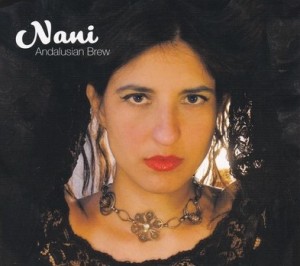 ‘Andalusian Brew’ heet de derde CD van Noam Vazana die ze opnam met haar groep Nani. Een album met Sefardisch repertoire van de verdreven Joden uit Spanje, eind 15de eeuw, gezongen in het Ladino. Eeuwenoud repertoire dat door deze in Amsterdam wonende zangeres een nieuw leven krijgt.
‘Andalusian Brew’ heet de derde CD van Noam Vazana die ze opnam met haar groep Nani. Een album met Sefardisch repertoire van de verdreven Joden uit Spanje, eind 15de eeuw, gezongen in het Ladino. Eeuwenoud repertoire dat door deze in Amsterdam wonende zangeres een nieuw leven krijgt.
English version below
Zangeres Noam Vazana is een uniek talent. Naast zangeres is zij ook pianiste en tromboniste. Ze studeerde in Amsterdam, richt haar eigen band op en neemt in 2011 haar debuut-CD ‘Daily Sketch’ op. Maar het muzikale balletje gaat pas echt rollen als zij in 2014 wordt uitgenodigd om op het Tanjazz Festival te komen spelen in Marokko. Het land waar haar ouders zo’n zestig jaar gelden uit emigreerden en zich vestigden in Israël. Tijdens haar verblijf in Marokko hoort Noam de door mannen, vrouwen en kinderen gezongen eeuwenoude Sefardische melodieën van de verdreven Joden uit Spanje. Haar inspiratie wordt nog verder aangewakkerd als zij deze liedjes herkent, als de melodieën die haar oma voor haar zong, in het Ladino, de oude Spaans-Joodse taal. Ze besluit een collectie Sefardische liederen uit te brengen dat nu, na drie jaar, een feit is met haar nieuwe, tweede album ‘Andalusian Brew’. Noam Vazana heeft een fijne heldere stem waarmee ze in spontane en soms ongepolijste versies een mooie doorsnede van bekend en minder bekend Sefardisch repertoire laat horen. In het lied ‘Puncha Puncha’ (de Geurende Roos) word je op organische manier meegenomen in een dynamisch liefdeslied, terwijl het bruiloftslied ‘Morenica’ een ingetogen exposé is begeleid op gitaar met glasharp op de achtergrond. In de begeleiding horen we naast percussie vooral de akoestische gitaar die haar op folk-achtige begeleidt, met een vleug klassiek zoals in het tintelende ‘Puncha Puncha’. Uit de opnames op ‘Andalusian Brew’ blijkt de sterke melodische kracht van het oud-Joods Spaans repertoire. Muziek die nog het best tot zijn recht komt in sobere uitvoeringen wat bijzonder goed is gelukt en dit album een diepgang bezorgt die nog eeuwenlang stand houdt.
Noam Vazana treedt met haar groep Nani op tijdens de Haagse Uit-nacht, op 2 sept 2017. / Korzo – Den Haag 23 sept. / International Day – Den Haag 24 sept.
English version
‘Andalusian Brew’ is the thirth CD of Noam Vazana, an album which she recorded with her group Nani with Sefardian repertoire of the expelled Jews from Spain, late 15th century, sung in Ladino. Great songs who is given a new life by this Amsterdam-based singer.
Singer Noam Vazana is a unique talent. In addition to a vocalist, she is also a pianist and trombonist. She studied in Amsterdam, founded her own band and recorded her debut CD ‘Daily Sketch’ in 2011. When she was invited to play at the Tanjazz Festival in Morocco in 2014, she found a new way in expressing herself. Morocco, the country that her parents left and settled in Israel, about sixty years ago. During her stay in Morocco, Noam heard the old Sefardian melodies of the expelled Jews from Spain sung by men, women and children. Her inspiration is further enhanced when she recognizes these songs as the melodies that her grandmother sang for her, in Ladino, the ancient Spanish-Jewish language. She decides to release a collection of Sefardian songs. And now after three years her new second album ‘Andalusian Brew’ is released. Noam Vazana has a lovely bright clear voice. In spontaneous and sometimes unpolished versions she sings a wonderful compilation of known and less famous Sefardian repertoire. In the song ‘Puncha Puncha’ (the Scented Rose) she leads you organically into a dynamic love song. The wedding song ‘Morenica’ is accompanied by an understated exposition on a guitar with some kind of a glass sharp (by the electronic instrument, the EW) in the background. In the accompaniment, besides percussion, we hear the acoustic guitar who accompanies her on a folk-way, with a classical touch in the sparkling ‘Puncha Puncha’. Noam Vazana shows the strong melodic power of the ancient Jewish Spanish repertoire in a sober and intense performances. Very well done!
- Nani: ‘Andalusian Brew’ (Eigen Beheer / Xango)
© Mattie Poels.

Geen reacties